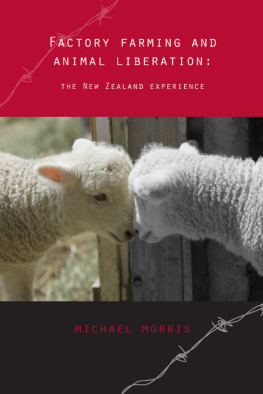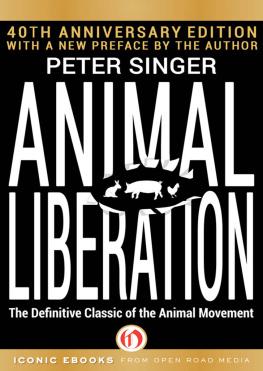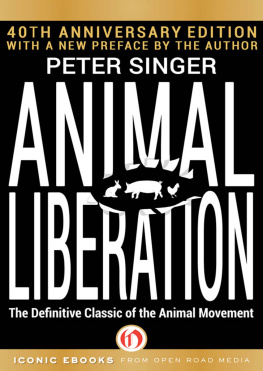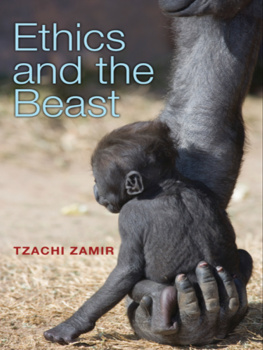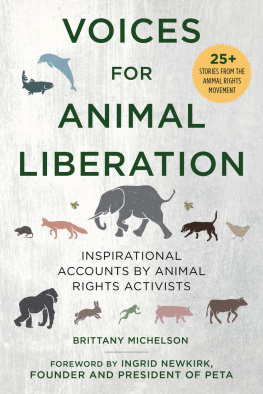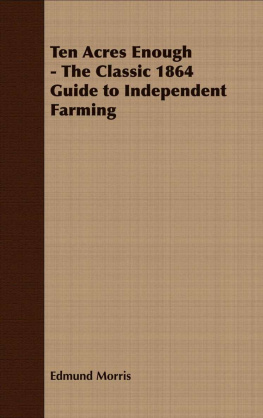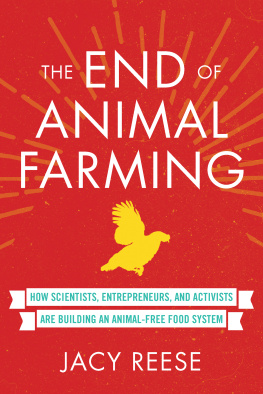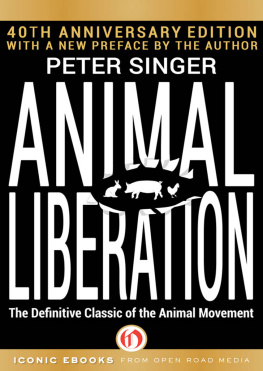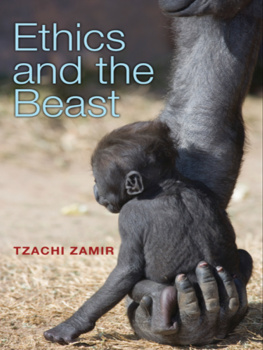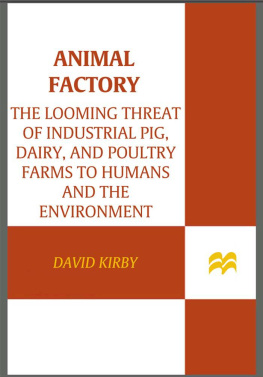Michael Morris - Factory Farming and Animal Liberation: The New Zealand Experience
Here you can read online Michael Morris - Factory Farming and Animal Liberation: The New Zealand Experience full text of the book (entire story) in english for free. Download pdf and epub, get meaning, cover and reviews about this ebook. year: 2012, genre: Politics. Description of the work, (preface) as well as reviews are available. Best literature library LitArk.com created for fans of good reading and offers a wide selection of genres:
Romance novel
Science fiction
Adventure
Detective
Science
History
Home and family
Prose
Art
Politics
Computer
Non-fiction
Religion
Business
Children
Humor
Choose a favorite category and find really read worthwhile books. Enjoy immersion in the world of imagination, feel the emotions of the characters or learn something new for yourself, make an fascinating discovery.
- Book:Factory Farming and Animal Liberation: The New Zealand Experience
- Author:
- Genre:
- Year:2012
- Rating:5 / 5
- Favourites:Add to favourites
- Your mark:
- 100
- 1
- 2
- 3
- 4
- 5
Factory Farming and Animal Liberation: The New Zealand Experience: summary, description and annotation
We offer to read an annotation, description, summary or preface (depends on what the author of the book "Factory Farming and Animal Liberation: The New Zealand Experience" wrote himself). If you haven't found the necessary information about the book — write in the comments, we will try to find it.
Michael Morris: author's other books
Who wrote Factory Farming and Animal Liberation: The New Zealand Experience? Find out the surname, the name of the author of the book and a list of all author's works by series.
Factory Farming and Animal Liberation: The New Zealand Experience — read online for free the complete book (whole text) full work
Below is the text of the book, divided by pages. System saving the place of the last page read, allows you to conveniently read the book "Factory Farming and Animal Liberation: The New Zealand Experience" online for free, without having to search again every time where you left off. Put a bookmark, and you can go to the page where you finished reading at any time.
Font size:
Interval:
Bookmark:
Factory Farming and AnimalLiberation: The New Zealand Experience
Copyright 2012by Michael Morris
Revised June2020
The editorialassistance of Dr. Michael O'Leary, and the encouragement of Dr.Peter Beatson is gratefully acknowledged. Jessie Hume designed thecover.
The politicallandscape has changed markedly in the last 10 years since this bookwas first conceived. A vegan world by 2050 would have been a dreamten years ago, but is now becoming something we can strive for.
Unfortunately,we still have a long way to go. Descriptions of the way animals aretreated in New Zealand are still relevant in 2020. The historicalexamples of manipulation by special interest groups are also stillsomething that activists can learn from.
It is for thisreason that I have decided to re-publish this book with only minorchanges. A full update for the 2020s is a work in progress.
**~~~**
TABLE OFCONTENTS
?
**~~~**
Governmentorganisations (New Zealand)
AWAC
Animal WelfareAdvisory Committee. The forerunner of NAWAC (qv.)
NAEAC
N ational Animal Ethics Advisory Committee.The independent government committee with statutory authority underthe Animal Welfare Act to advise the Minister of Agriculture onmatters concerning animal experimentation.
NAWAC
National AnimalWelfare Advisory Committee. The independent government committeewith statutory authority under the Animal Welfare Act to advise theminister of agriculture on legally binding Codes of Welfare.
MAF
Ministry ofAgriculture and Forestry. The animal welfare team in theBiosecurity Authority division provides policy advice to theMinister of Agriculture. In 2012, most functions of MAF, includinganimal welfare, transferred to the new Ministry of PrimaryIndustries.
PCE
ParliamentaryCommissioner for the Environment. An independent body reporting toParliament, not the executive government. This organisationconducts research and publishes reviews on threats to theenvironment
Governmentorganisations (other states)
AHAW
Animal Healthand Welfare Committee. Part of the European Food StandardsAuthority (EFSA). A European Commission group advising on foodsafety and animal welfare standards.
FAWC
Farm AnimalWelfare Council of the UK. A government advisory body. The FAWCfirst identified the Five Freedoms that are now part of governmentpolicy in New Zealand on animal welfare
SCAHAW
ScientificCommittee of Animal Health and Animal Welfare. A scientificadvisory committee of the European Commission called upon to giveadvise on welfare matters. This committee published a scientificreview on the welfare of broiler chickens.
SVC
ScientificVeterinary Committee. The forerunner of the SCAHAW (qv.). The SVCpublished scientific reviews on the welfare of intensively farmedpigs and layer hens.
USDA
United StatesDepartment of Agriculture. The federal government agencyresponsible for (among other things) enforcement of the HumaneSlaughter Act.
Industryorganisations
ANZCCART
Australian andNew Zealand Council for the Care of Animals in Research andTeaching. An organisation jointly funded by government and industrygroups to facilitate discussion on animal experimentation.
EPF
Egg ProducersFederation of New Zealand. The statutory lobby group for the eggindustry.
NZPIB
New ZealandPork Industry Board. The statutory lobby group for the pigindustry.
NZVA
New ZealandVeterinary Association. The statutory professional body of theveterinary profession
PIANZ
PoultryIndustry Association of New Zealand. The industry lobby group forthe broiler chicken industry.
Animalrights/welfare/liberation groups, New Zealand
2020 note: Many of these are fluidgrass-roots groups and are therefore changing all the time. Most ofthe groups listed are now either defunct or have morphed intodifferent groupings as the political and social landscapechanges.
CAFF forexample changed its emphasis from factory farming to all animalexploitation, and became Speak Up for Animals.
AFA
Animal FreedomAotearoa. A grass roots group with activists in Auckland andWellington.
ARLAN
Animal RightsLegal Advocacy Network. An organisation of lawyers and law studentsspecialising in legal defence of animal interests. The organisationwas active in the 2000s, but now appears largely inoperative.
CAFF
CampaignAgainst Factory Farming. An animal welfare lobby and educationalgroup based in Wellington. This group was active in the 2000s butdisbanded in 2011 after SAFE started campaigning on factory farmingin Wellington.
RNZSPCA
Royal NewZealand Society for the Prevention of Cruelty to Animals. Theumbrella group for a number of SPCA branches around the country.The RNZSPCA accredit free range and barn eggs and free range porkto comply with higher welfare standards.
SAFE
Save AnimalsFrom Exploitation. A national animal welfare lobby and activistgroup. SAFE has local branches all around the country.
Animalrights/welfare/liberation groups other states
CWF
Compassion inWorld Farming. A UK based group campaigning for better treatment offarmed animals.
PETA
People for theEthical Treatment of Animals. A large nationally based animalrights group in the USA. There is also an Asia/Pacific branch,which includes Australia and New Zealand in its sphere ofoperation.
VGT
Verein GegenTierfabriken (English translation: Association Against AnimalFactories). Austrian Animal Rights group credited with being thedriving force behind a ban on caged hens.
**~~~**
The question isnot, can they reason? Nor Can they talk? But, Can they suffer?
JeremyBentham
This book isabout the rights and freedoms of animals. Specifically the rightsof those animals who are close to us, the animals we use for foodin this supposedly enlightened country. But it is also about humanrights, namely the rights of humans in a democracy to have theirvoices listened to and acted on by their democratically electedleaders.
In present dayAotearoa New Zealand most people eat meat, so they have littlesympathy with the idea that all animals should be able to enjoy thesame freedoms as human members of society. At the same time,however, there is widespread opposition to the cruelties involvedin the factory farming of broiler chickens, layer hens and pigs. Onthe issue of factory farming New Zealanders have made their wishesquite clear to government decision makers.
For example,Colmar Brunton polls in 2002 found that 79% of those polled agreedthat battery cages for layer hens should be banned, and 87% opposedthe use of cramped and narrow sow stalls for pregnant sows. Whilethe government was seeking submissions on a review of the welfarecodes for layer hens and pigs, Minister of Agriculture, Jim Sutton,received a record 64,000 post cards demanding the abolition of sowstalls, and over 100,000 postcards wanting a ban on battery cages.The breadth of feeling must have taken the minister by surprisebecause the ministerial postal budget was unable to cover the sheervolume of freepost submissions.
In determining that severeconfinement of animals in cages is inhumane, the public is speakingwith the voice of common sense, which as one animal welfareresearcher has stated, shows a surprising level of agreement withthat of experienced scientists when it comes to animal welfare (1).Yet government officials have poured scorn on the common sensescience of the lay public. An official from the National AnimalWelfare Advisory Committee went as far as to compare members of thepublic wanting welfare reform with medieval zealots opposingGalileo's theory (2). At the same time, however, officials have feigneddeafness to the increasing number of established scientists who arealmost universal in their condemnation of intensive (factory)farming (see Chapters 4-7).
Next pageFont size:
Interval:
Bookmark:
Similar books «Factory Farming and Animal Liberation: The New Zealand Experience»
Look at similar books to Factory Farming and Animal Liberation: The New Zealand Experience. We have selected literature similar in name and meaning in the hope of providing readers with more options to find new, interesting, not yet read works.
Discussion, reviews of the book Factory Farming and Animal Liberation: The New Zealand Experience and just readers' own opinions. Leave your comments, write what you think about the work, its meaning or the main characters. Specify what exactly you liked and what you didn't like, and why you think so.

